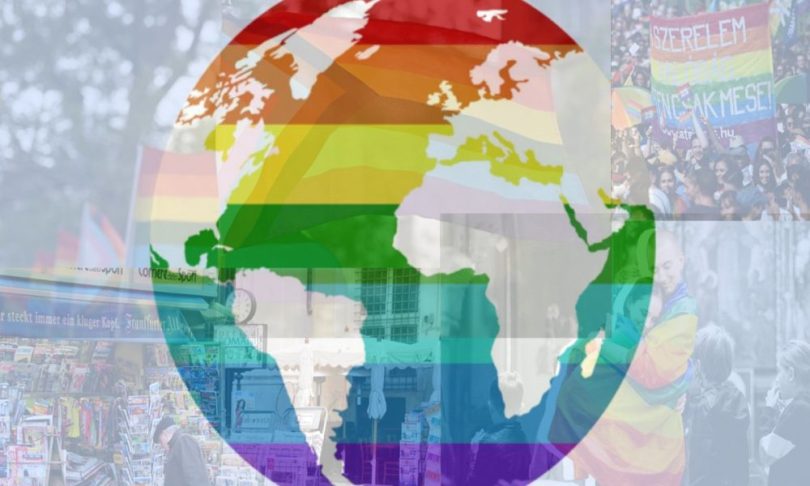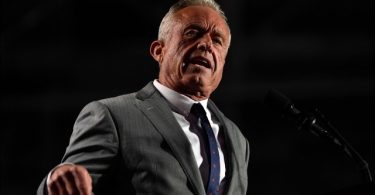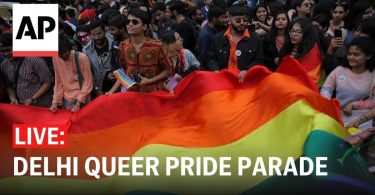Editor’s note: International News Editor Michael K. Lavers was on assignment in Israel from Oct. 4-14.
JERUSALEM — LGBTQ Israelis and the groups that advocate for their rights continue to struggle with the aftermath of Oct. 7.
Hadas Kerem Bloemendal is the chair of Jerusalem Open House for Pride and Tolerance, a group that organizes the city’s annual Pride parade. The therapist and former Israel Defense Forces intelligence officer who is raising twins with her wife spoke with the Washington Blade on Oct. 8 at Jerusalem Open House’s offices that are located near the city’s Zion Square.
Bloemendal said she and her colleagues in the days after Oct. 7 realized a lot of LGBTQ Israelis would not ask for help “from regular hotlines because they are afraid that the people that will answer will not be gay-friendly enough or will not understand the complexity of what they are going through.”
She told the Blade a closeted man in a message he posted to an online bulletin board said he is “really afraid because his boyfriend was kidnapped, and he can’t tell anyone because he’s gay and he’s not out, and if anyone would find out, what would they do to him.”
The man’s boyfriend is one of 251 people who Hamas militants kidnapped on Oct. 7. It remains unclear whether all of the 101 hostages who remain in the Gaza Strip are still alive.
“You can’t imagine such a thing,” said Bloemendal.
A group of gay-friendly therapists after Oct. 7 volunteered to hold virtual sessions for Jerusalem Open House. The group also created a Google spreadsheet to streamline referrals.
Bloemendal said Jerusalem Open House received more than 80 calls in the two weeks after Oct. 7.
The Jewish Federations of North America gave Jerusalem Open House funding to continue the program. Jerusalem Open House subsequently created a network of LGBTQ-friendly therapists and social workers throughout Israel who work with the transgender community, Orthodox men and women, Arab Israelis, and other groups.
“People who lost family members, people who are evacuated from their homes are getting therapy through the project,” said Bloemendal.
She added Jerusalem Open House also works with IDF reservists, “people who were hurt during this war,” and “people who were already in a very fragile state before the war started.”
“When you are a fragile population, war only makes it worse,” said Bloemendal.

Yam Bahar is a spokesperson for Pride House of Be’er Sheva in Be’er Sheva, which is southern Israel’s largest city. The freelance photographer and editor who also manages a local bar spoke with the Blade on Oct. 9.
A Bedouin man three days earlier killed an Israel Border Police officer and injured 10 others when he attacked Be’er Sheva’s main bus station. It is less than a mile from Pride House of Be’er Sheva.


Pride House of Be’er Sheva, like Jerusalem Open House, offered psychological support to the local community after Oct. 7. Pride House of Be’er Sheva also started a “hamal” or “war room” in Hebrew that coordinated donations of food and children’s toys to displaced families.
“It was important for the community here to do this,” Bahar told the Blade.
Pride House of Be’er Sheva also distributes food on holidays.
“We’re trying to make this a place that can address real problems of people who are here,” said Bahar.
The Aguda, the Association for LGBTQ Equality in Israel, after Oct. 7 worked with other advocacy groups to host displaced people. The Aguda also made care packages for IDF soldiers, and offered mental health services.
“We did our best,” Aguda CEO Yael Sinai Biblash told the Blade on Oct. 8. “LGBTQ people in Israel are vulnerable, and once we’re at war they are more vulnerable.”
“They need more help,” she added.
Hamas militants on Oct. 8, 2023, killed IDF Maj. Sagi Golan in Be’eri, a kibbutz that is near the Israel-Gaza border. His fiancé, Omer Ohana, with the support of the Aguda and other advocacy groups, successfully lobbied Israeli lawmakers to amend the country’s Bereaved Families Law to recognize LGBTQ widows and widowers of fallen servicemembers.
Biblash is among the hundreds of people who attended Golan’s memorial service that took place at a community in the Tel Aviv suburb of Herzliya on Oct. 8. Biblash spoke with the Blade after it ended.
“It was a big effort and a big success,” she said, referring to the campaign to change the Bereaved Families Law.
The activists with whom the Blade spoke readily acknowledged Oct. 7 and its aftermath have particularly harmed LGBTQ Palestinians.
Bloemendal noted Jerusalem Open House works with people from the West Bank, Israeli settlements, and Arab cities throughout the region.
“It’s about whether you can come here,” she said. “Once you come here, we don’t care where you come from.”
The Tel Aviv Court for Administrative Affairs in February ruled LGBTQ Palestinians can request asylum in Israel based on persecution they suffer in their homeland because of their sexual orientation or gender identity. Bloemendal noted the additional restrictions on travel from the West Bank that Israel implemented after Oct. 7 has left LGBTQ Palestinians even more vulnerable and isolated.
“Some of them could come and go before, but … everything is more closed now because they (Israeli authorities) are afraid of suicide bombs and things like that,” she said. “It’s much harder to leave home, so you don’t even have your one time a week getting out to Jerusalem and having your LGBTQ experience.”
Neesha Gagement of the Israeli Transgender Association, a group that works with Palestinian trans sex workers in Jaffa, spoke with the Blade on Oct. 13 at her office in Tel Aviv’s Neve Sha’anan neighborhood.
She said many of the sex workers with whom she and her colleagues work faced discrimination, harassment, and other challenges before Oct. 7 — and some chose “a very Israeli name” and did not “speak out” as a result. Gagement told the Blade that many of them are now afraid of leaving their homes, have stopped using social media, and even planning to leave Israel.
“[They are] terrified of expressing their opinion,” she said.
The Israeli Transgender Association since Oct. 7 has offered virtual psychological services. Therapists in some cases will also meet clients at coffee shops close to where they live.

The Israeli government says Hamas militants on Oct. 7 killed roughly 1,200 people, including upwards of 360 partygoers at the Nova Music Festival near Re’im, a kibbutz that is a few miles southwest of Be’eri. The Hamas-controlled Gaza Health Ministry says Israeli forces have killed more than 42,000 people in the enclave since Oct. 7.
The International Criminal Court in May announced it plans to issue arrest warrants for Israeli Prime Minister Benjamin Netanyahu, Israeli Defense Minister Yoav Gallant, and three Hamas leaders — Yahya Sinwar, Mohammed Deif, and Ismail Haniyeh.
Karim Khan, the ICC’s chief prosecutor, said the five men have committed war crimes and crimes against humanity in Gaza and Israel. (A suspected Israeli airstrike on July 31 killed Haniyah while he was in the Iranian capital of Tehran to attend Iranian President Masoud Pezeshkian’s inauguration. IDF soldiers on Oct. 16 killed Sinwar in Rafah, a city in southern Gaza that borders Egypt.)
Hamas, which the U.S. and Israel have designated a terrorist organization, claimed responsibility for an Oct. 1 attack at a light rail station in Jaffa that left seven people dead and more than a dozen others injured.
Hezbollah, an Iran-backed militant group the U.S. and Israel have designated a terrorist organization, since Oct. 8, 2023, has been regularly launching rockets and missiles from Lebanon to Israel.
The Lebanese Health Ministry has said Israeli airstrikes in Beirut and elsewhere in the country in recent weeks have killed upwards of 2,500 people.
An Israeli airstrike in the Beirut suburb of Dahieh on Sept. 27 killed long-time Hezbollah Secretary-General Hassan Nasrallah. Iran on Oct. 1 launched upwards of 200 ballistic missiles at Israel in retaliation.
Hamas on the anniversary of Oct. 7 launched rockets that triggered sirens in Tel Aviv and surrounding areas. The Houthi rebels in Yemen on the same day launched missiles and drones that prompted additional warnings in central Israel. Hezbollah missiles on the anniversary of Oct. 7 also targeted an IDF base north of Tel Aviv.
Israel’s air defense system intercepted almost all of the rockets and missiles.
Oct. 7 and the war has directly impacted several of the activists with whom the Blade spoke.
Hamas militants kidnapped Alex Dancyg, a historian at Yad Vashem, Israel’s Holocaust memorial, from his home in Nir Oz, a kibbutz that is roughly two miles from Khan Younis, a city in southern Gaza.
The militants later killed Dancyg, and the IDF on Aug. 20 recovered his body from a tunnel in Khan Younis. His wife and young twins spent upwards of 18 hours trapped in Nir Oz on Oct. 7 before the IDF rescued them.
Bloemendal became friends with Dancyg when she worked at Yad Vashem. She became emotional when she spoke about him.
“I learned a lot from him,” said Bloemendal. “We became friends.”
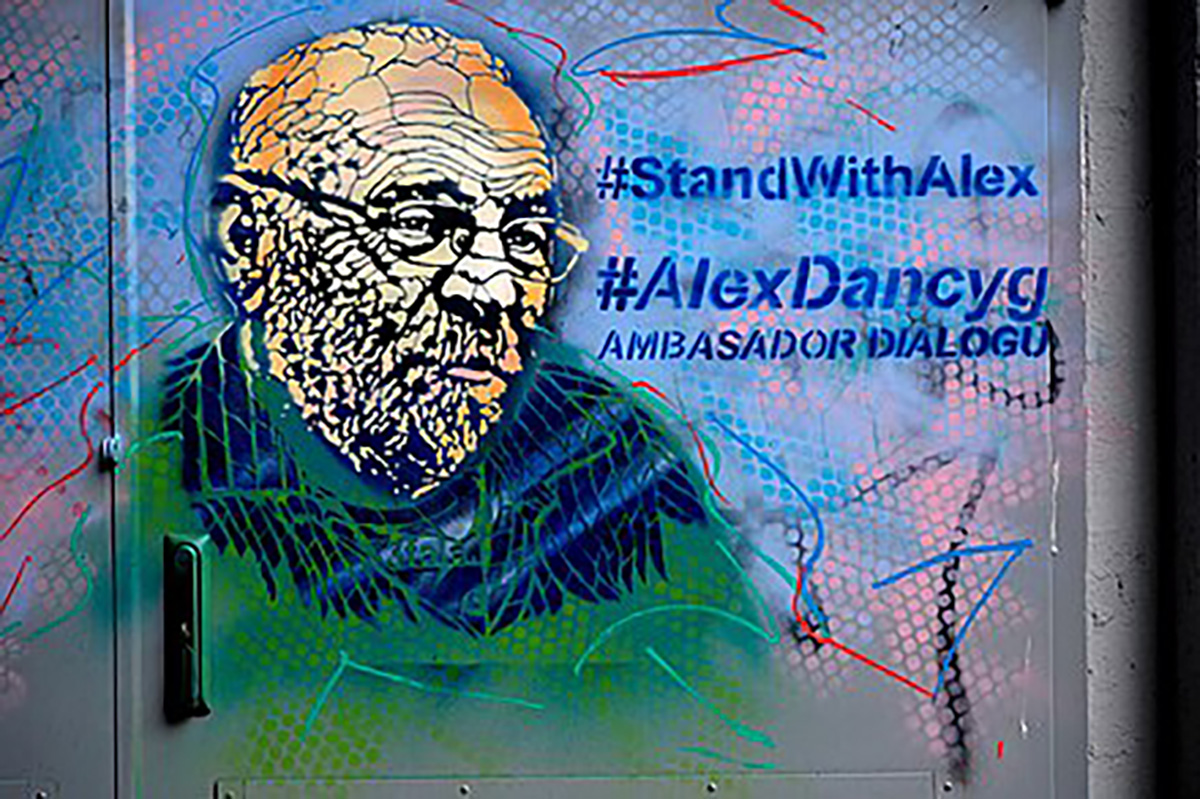
Bloemendal’s brother is an IDF reservist who fought Hamas militants in Gaza. His wife and their three young children left their home in Kiryat Gat, a city in southern Israel that is roughly 20 miles east of Gaza, and lived with Bloemendal’s parents and other relatives in Jerusalem for several months.
“We try to help as best as we can, but she has three kids under the age of five,” said Bloemendal. “No matter how much you help it’s not the same.”
Ala Ibrahim, 30, is a gay Druze man who grew up Majdal Shams, a predominantly Druze community in the Golan Heights. He moved to Tel Aviv a decade ago, and works in the city’s high tech industry.
Ibrahim on July 27 was about to board a flight to Israel from Bangkok when his mother called him and told him a Hezbollah rocket had struck a soccer field in Majdal Shams.
He told the Blade on Oct. 14 during a telephone interview that he knew the rocket had killed nine children when the flight took off. Ibrahim landed at Ben-Gurion Airport 10 hours later, and heard a reporter read the names of the 12 victims on the radio while he was in a taxi.
Three of them — Johnny Wadeea Ibrahim, Guevara Ibrahim Ibrahim, and Alma Ayman Fakhr al-Din — were his cousins.
“That’s how I knew,” said Ibrahim.
He quickly returned to Majdal Shams with his cousin.
Ibrahim said the victims’ caskets were not open at their funerals “because all of them were not in a state where they could be shown.” He told the Blade that children were crying because they could no longer play with their friends.
“It was a heartbreaking day to be there,” said Ibrahim.
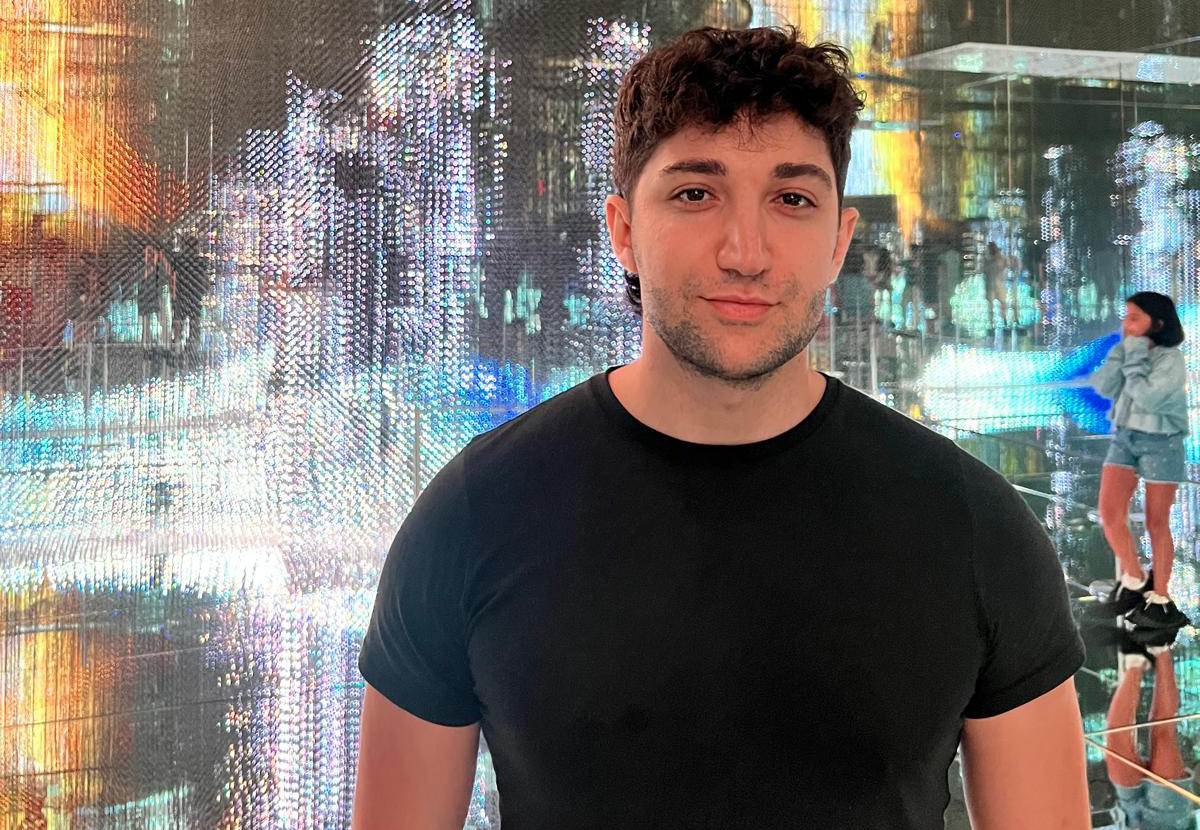
The Nova Music Festival was less than 30 miles from Be’er Sheba.
Former Pride House of Be’er Sheva Chair Ariella Menaker told the Blade less than a week after Oct. 7 that she received an invitation to attend one of the festival’s parties. She said she knew at least five people who had been killed.
“It’s a close-knit group,” said Menaker. “Even people you don’t know by name; you’ve partied with them; you know them. You’ve known them for years from the dance floor.”
“I keep thinking about them, trying to escape,” she added.
Bahar said “everyone knows someone” who was killed on Oct. 7.
“We can’t see the end right now,” Biblash told the Blade after Golan’s memorial service.
She lives outside of Tel Aviv with her 1-year-old child.
Biblash described the Iranian missile attack against Israel on Oct. 1 as “terrifying.” She also said her child sleeps in her home’s safe room.
“That’s crazy,” said Biblash. “That should not happen.”

